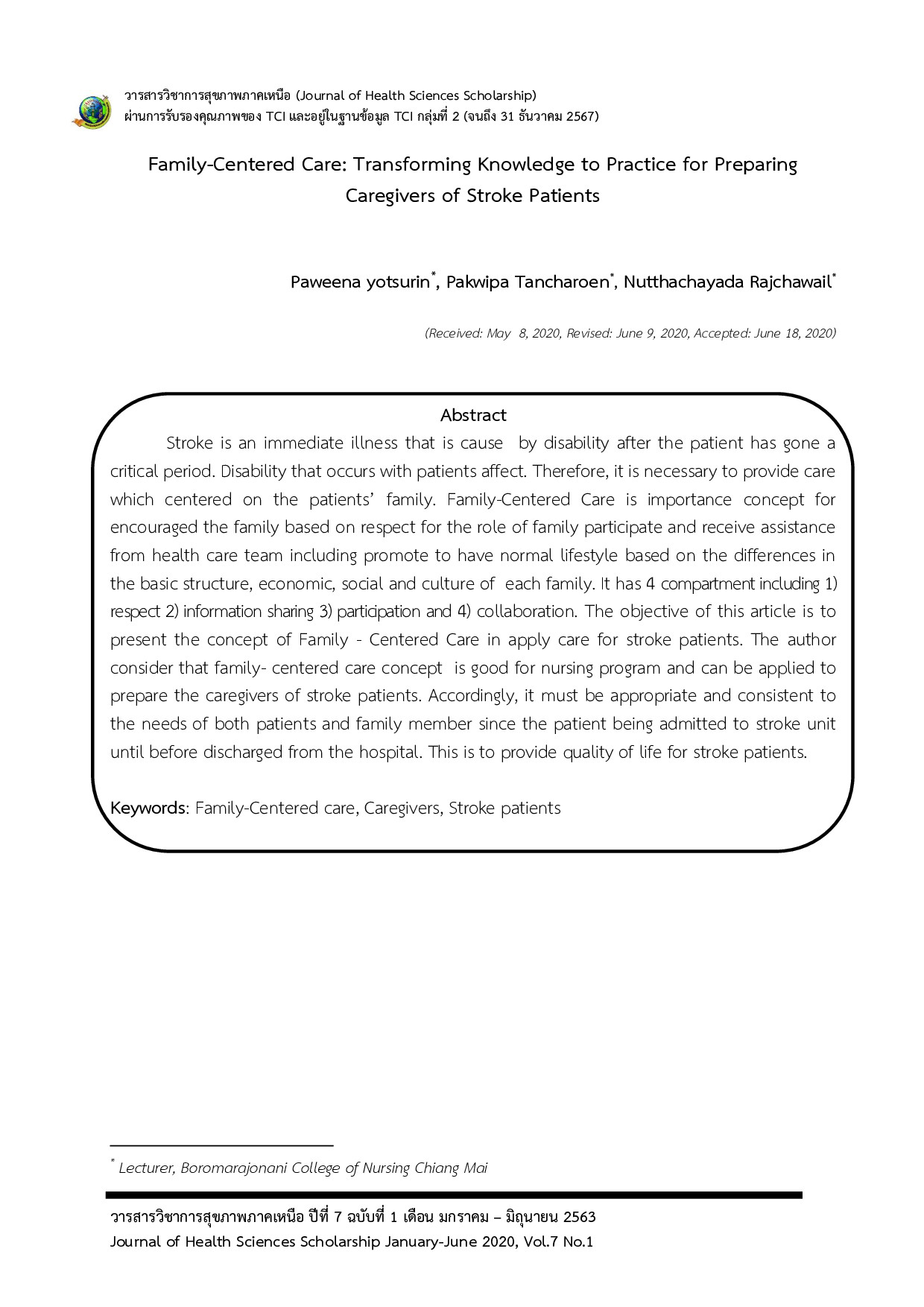Family-Centered Care: Transforming Knowledge to Practice for Preparing Caregivers of Stroke Patients
คำสำคัญ:
การดูแลโดยเน้นครอบครัวเป็นศูนย์กลาง, ผู้ดูแล, ผู้ป่วยโรคหลอดเลือดสมองบทคัดย่อ
การเจ็บป่วยด้วยโรคหลอดเลือดสมอง เป็นการเจ็บป่วยที่เกิดขึ้นอย่างทันทีทันใด และทำให้เกิดความพิการหลงเหลือภายหลังผู้ป่วยผ่านพ้นในระยะวิกฤติ ทั้งนี้ความพิการที่เกิดขึ้นกับผู้ป่วยนั้นจะส่งผลเกี่ยวกับการเคลื่อนไหว การสื่อสาร การกลืนและการขับถ่าย (American Stroke Association, 2019) จากผลกระทบดังกล่าวผู้ป่วยจำเป็นต้องได้รับการดูแลจากคนในครอบครัวอย่างต่อเนื่อง เพื่อให้ผู้ป่วยมีคุณภาพชีวิตที่ดี ซึ่งการดูแลผู้ป่วยที่เน้นครอบครัวเป็นศูนย์กลางนั้น ถือเป็นแนวคิดที่ให้ความสำคัญกับครอบครัว เนื่องจากครอบครัวมีความสำคัญที่สุดสำหรับชีวิตของผู้ป่วยโรคหลอดเลือดสมองที่ผู้ป่วยต้องการการพึ่งพาจากผู้ดูแลที่เป็นสมาชิกในครอบครัว ดังนั้นแนวคิดนี้จึงอยู่บนพื้นฐานของการเคารพในบทบาทของครอบครัว ให้ครอบครัวมีการทำงานร่วมกับบุคลากรทีมสุขภาพ ซึ่งครอบครัวจะได้รับการช่วยเหลือตามศักยภาพ รวมทั้งได้รับการส่งเสริมให้มีแบบแผนการดำเนินชีวิตตามปกติ และคำนึงถึงความแตกต่างของโครงสร้างพื้นฐาน เศรษฐกิจ ฐานะ และวัฒนธรรมทางสังคมของแต่ละครอบครัว ซึ่งประกอบด้วยคุณลักษณะ 4 ประการได้แก่ 1) การยอมรับและเคารพ (respect) 2) การแลกเปลี่ยนข้อมูล (information sharing) 3) การมีส่วนร่วม (participation) และ4) การประสานความร่วมมือ (collaboration) ซึ่งบทความนี้มีวัตถุประสงค์เพื่อนำเสนอแนวคิดการดูแลที่เน้นครอบครัวเป็นศูนย์กลางสู่การประยุกต์ใช้ในการเตรียมความพร้อมผู้ดูแลผู้ป่วยโรคหลอดเลือดสมอง ทั้งนี้คณะผู้เขียนเห็นว่าแนวคิดการดูแลที่เน้นครอบครัวเป็นศูนย์กลางนั้น มีรูปแบบการพยาบาลที่ดี และเหมาะที่จะนำมาใช้ในการเตรียมความพร้อมผู้ดูแลผู้ป่วยโรคหลอดเลือดสมอง ดังนั้นการนำไปใช้ในการดูแลผู้ป่วยโรคหลอดเลือดสมองนั้นต้องมีความเหมาะสม สอดคล้อง และตอบสนองต่อความต้องการของทั้งผู้ป่วยและคนในครอบครัว ตั้งแต่ที่ผู้ป่วยเข้ารับการรักษาในหอผู้ป่วยโรคหลอดเลือดสมองจนกระทั่งก่อนจำหน่ายออกจากโรงพยาบาล ทั้งนี้เพื่อให้เกิดคุณภาพในการดูแลผู้ป่วยและส่งผลให้ผู้ป่วยโรคหลอดเลือดสมองมีคุณภาพชีวิตที่ดีต่อไป
เอกสารอ้างอิง
Ahmann, E., Dokken, D. (2014). Patient- and family–centered transitions from pediatric to adult care. Pediatric Nursing, 40(6), 307-309.
American Stroke Association (2019). Effects of stroke. [Online], Available: http://www.StrokeAssociation.org/Strokeorg/About Stroke/Effects Stroke/Effect-of stroke_UCM_308534+subhome page.jsp. (2019,13 Mach).
Charnnarong, N., & Chutinet. O. (2010). Neuroscience 1. Bangkok: Chulalongkorn University Printing House. (in Thai).
Davidson et al. (2017) Guidelines for Family-centered Care in the Neonatal, Pediatric, and adult ICU. Critical care Medicine, 45(1), 103-128.
Fongkerd, S., Himannanto, S., & Tantalanukul, S. (2016). Family-centered care : from theory to pracrice for end of life care of critical patients in intensive care unit based on thai context. Journal of Phrapokklao Nursing College, 27(1), 170-178. (in Thai).
Goldfarb,M., Bibas,L., Bartlett, V., Jones. B. & Khan, N. (2017). Outcomes of patient and family-centered care interventions in the ICU: a Systematic Review and Meta-Analysis. Critical Care medicine, 45(10), 1751-1761.
Gooding, J. S., Cooper, L. G., Blaine, A. I., Franck, L. S., Howse, J. L. & Berns S. D. (2011). Family support and family-centered care in the neonatal intensive care unit: Origins, advances, impact, Seminars in Perinatology, 35, 20-28. doi:10.1053/j.semperi.2010.10.004.
Institute for Patient-Family Centered Care. (2019). Patient-and family-centered care. [Online], Available: http://www.familycenteredcare.org. (2019, 20 February).
Keadphilom, C. & Laorpaksin, S. (2019). Effect of discharge planning with family center on perceived self-
efficacy of caregiver traumatic brain injury patients, Journal of Health and Nursing Research, 36(1), 98-111.
National Stroke Association. (2019). Stroke recovery. [Online], Available: http://www.stroke.org.
(2019, 13 February). (in Thai).
Rattanapreechakul, B. (2012). The Development of anxiety reduction pattern for family caregivers of stroke patients at the tertiary level hospital in Suphanburi province (Nursing thesis Master of Nursing Management Program). Graduate School, Christian University. (in Thai).
Senawong, P. (2007). Effect of providing information based on family-centered care concepts on anxiety level of mothers who had a low-birth-weight infant (Master of Nursing Thesis in Maternal and Newborn Nursing Program). Graduate School, Mahidol University. (in Thai).
Suwanwaipatthana. W. (2012). Family-centered care of children with chronic illness. Nonthaburi: Academic welfare project of Praboromrajchanok institute of ministry of public health.(in Thai).
World Health Organization. (2019). Cerebrovascular accident. [Online], Available: http://www.WHO.int/topics/cerebrovascular_accident/en/. (2019, 23 January).
Zajicek-Farber, M. L., Lotrecchiano, G. R., Long, T. M., & Farber, J. M. (2015). Parental perception of family centered care in medical homes of children with neurodevelopmental disabilities. Matern Child Health Journal, 1-12. doi: 10.1007/s10995-015-1688-z.

ดาวน์โหลด
เผยแพร่แล้ว
ฉบับ
ประเภทบทความ
สัญญาอนุญาต
บทความ ข้อมูล เนื้อหา รูปภาพ ฯลฯ ที่ได้รับการตีพิมพ์ในวารสารวารสารวิชาการสุขภาพภาคเหนือ ถือเป็นลิขสิทธิ์ของวารสารวารสารวิชาการสุขภาพภาคเหนือ หากบุคคลหรือหน่วยงานใดต้องการนำทั้งหมดหรือส่วนหนึ่งส่วนใดไปเผยแพร่ต่อหรือเพื่อกระทำการใดๆ จะต้องได้รับอนุญาตเป็นลายลักอักษรจากวารสารวารสารวิชาการสุขภาพภาคเหนือก่อนเท่านั้น
เนื้อหาและข้อมูลในบทความที่ลงตีพิมพ์ในวารสารวิชาการสุขภาพภาคเหนือถือเป็นข้อคิดเห็นและความรับผิดชอบของผู้เขียนบทความโดยตรงซึ่งกองบรรณาธิการวารสาร ไม่จำเป็นต้องเห็นด้วย หรือร่วมรับผิดชอบใดๆ
อนึ่ง ข้อความและข้อคิดเห็นต่างๆ เป็นของผู้เขียนบทความนั้นๆ ไม่ถือเป็นความเห็นของวารสารฯ และวารสารฯ ไม่จำเป็นต้องเห็นด้วยกับข้อความและข้อคิดเห็นใดๆ ของผู้เขียน วารสารฯ ขอสงวนสิทธิ์ในการพิจารณาตีพิมพ์ตามความเหมาะสม รวมทั้งการตรวจทานแก้ไขหรือขัดเกลาภาษาให้ถูกต้องตามเกณฑ์ที่กำหนด


